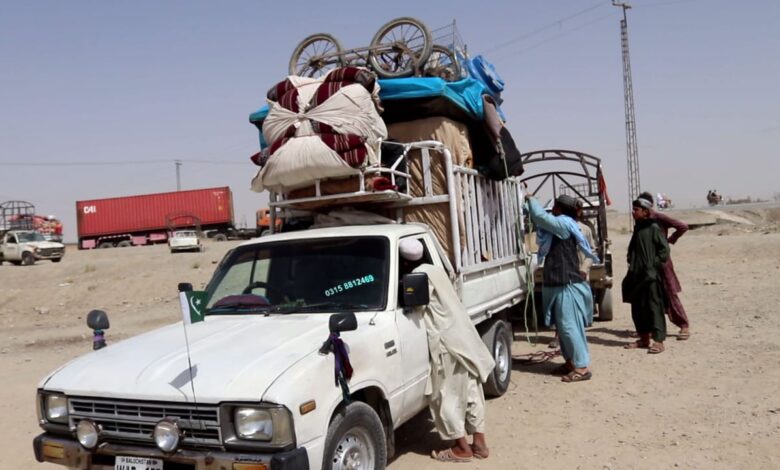
Hazrat Ali Attar
Following the final decision to deport all foreigners residing illegally in Pakistan, as part of the National Action Plan during the National Apex Committee meeting chaired by Caretaker Prime Minister Anwar ul Haq Kakar, the process of returning Afghan refugees living without legal documentation in Pakistan is in progress. To date, several Afghan families have returned to Afghanistan via Chaman and Torkham.
Captain (R) Athar Abbas, the Deputy Commissioner of District Chaman, informed TNN that approximately 15,000 Afghan refugees have voluntarily been repatriated to Afghanistan, with this process still ongoing. In light of the Apex Committee's decision, additional police personnel have been dispatched to Chaman from Quetta. Beginning on November 1, there will be a crackdown against undocumented foreign immigrants in Chaman city.
Sultan Rudi, the UNHCR Chaman district officer, revealed that 850,000 Afghan refugees are residing in Balochistan. Of these, 313,643 hold POR cards, 272,246 have ACC cards, and the remaining 262,111 people are residing without documents. Since January 1, 2023, 1,850 families holding POR cards have returned to Afghanistan. Following the government of Pakistan's decision, 17,500 Afghan refugees have returned to Afghanistan without proper documentation. Rudi noted that 100 to 150 families are leaving Pakistan weekly, with 750 to 800 Afghan refugees returning daily.
Also Read: KP Govt Employees Protest Pension and Salary Cuts – Demand Legislative Review
Thus far, 54,000 Afghan citizens have returned to their home country through the Chaman and Torkham border crossings. Sultan Rudi added that 50 percent of the refugees are departing from Karachi, 25 to 30 percent from Punjab, and 20 percent from Balochistan.
On the 8th of this month, during a one-day visit, the caretaker Chief Minister of Balochistan, Ali Mardan Domki, addressed a tribal jirga in Chaman. He declared that the Apex Committee's decision against Afghan refugees is final, and passport requirements will be enforced at the Chaman-Pak-Afghan border starting from November 1.
In response to this decision, tribal jirga leaders opposed the Chief Minister's application of passport requirements at the Chaman border and appealed for a review. Following this decision, the entire city engaged in protests and demonstrations, with various political parties initiating protest rallies. On October 20, a sit-in protest took place against the ongoing crackdown on Afghan refugees on the Chaman-Pak-Afghan border highway, along with the imposition of passport requirements, led by the All Parties Anjuman Tajran Laghari Ittihad and local tribes.
The spokesperson for the sit-in, Olas Yar Khan Achakzai, from the Pashtunkha Milli Awami Party, emphasized that the application of passport requirements at the border was against international law. He called for the facilitation of trade and the ease of cross-border pedestrian traffic.
Caretaker federal interior minister Sarfaraz Bugti clarified that the government's ultimatum to leave Pakistan applies to all foreigners residing in the country without legal status. He asserted that it is not limited to Afghan nationals.
While briefing the Senate Standing Committee on Interior, Sarfraz Bugti mentioned that the government's focus was on deporting illegal residents in Pakistan, but the message conveyed suggested that only Afghan nationals might be deported. He clarified that individuals with refugee cards or valid visas are not affected, as they are considered guests.
Bugti emphasized that the situation is not racially motivated but is concerned with repatriating all undocumented residents.
It's important to note that the federal government has set a deadline of October 31 for undocumented foreigners to leave Pakistan.